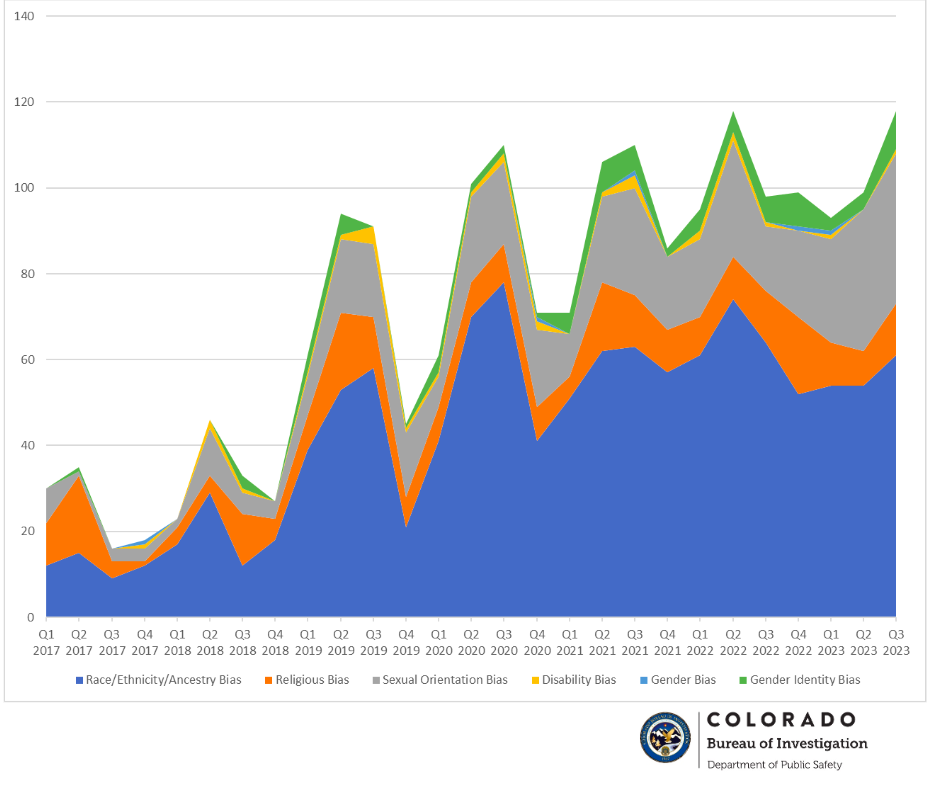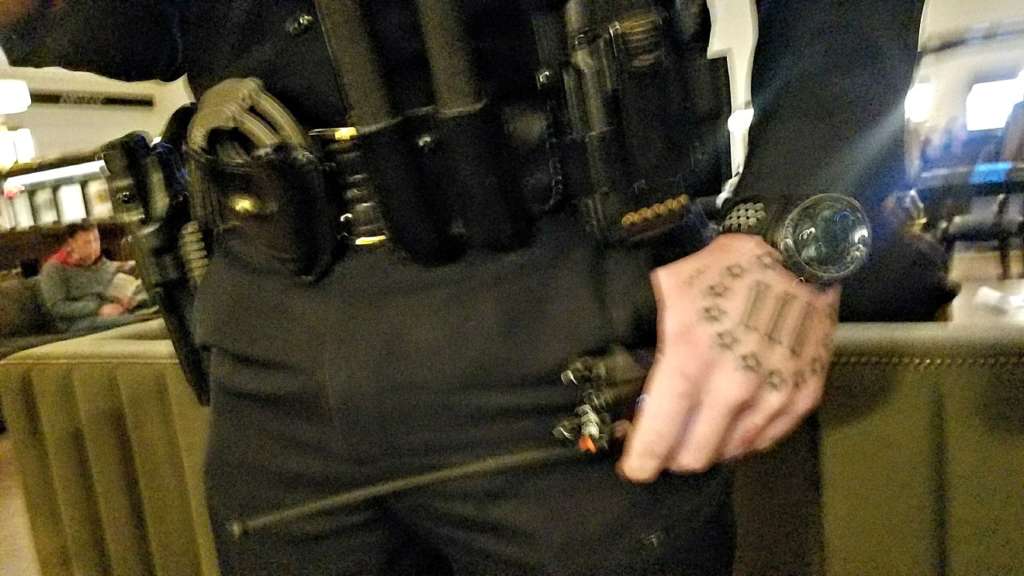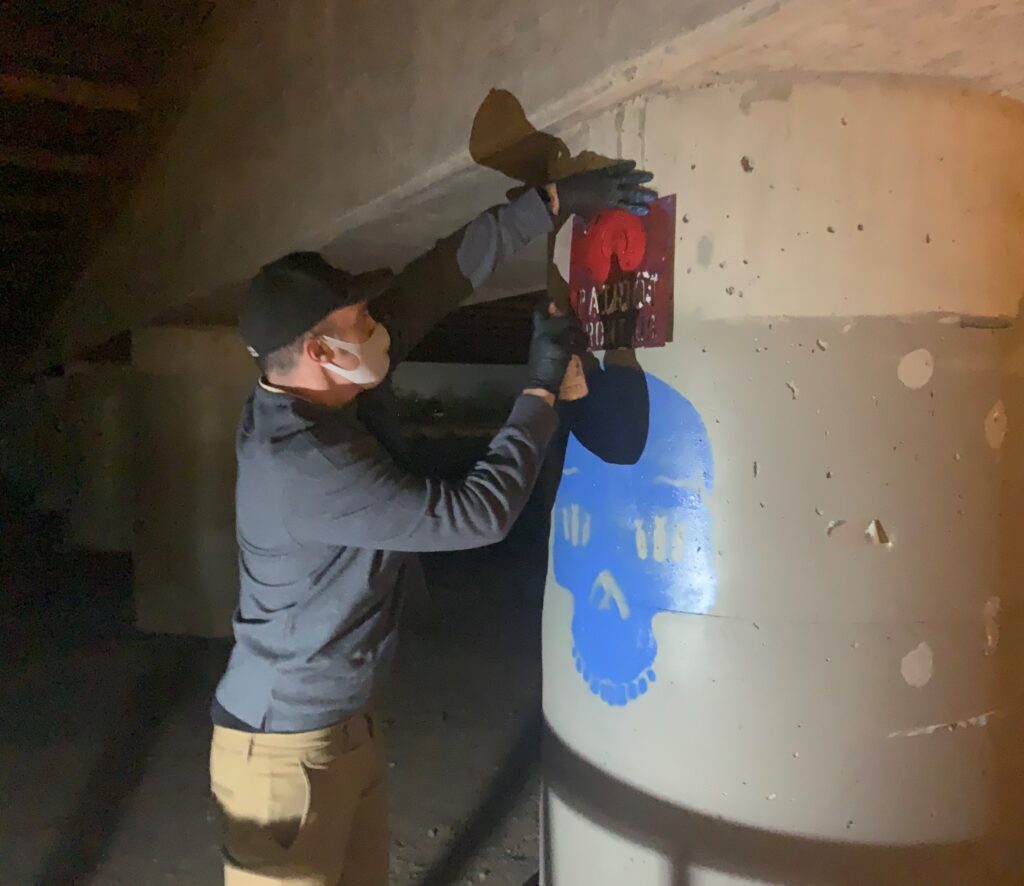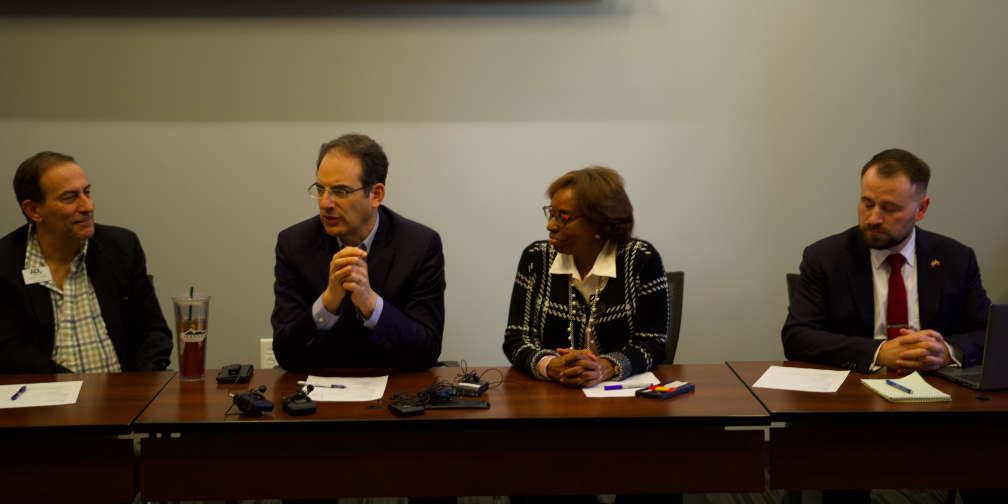Colorado Sen. Rhonda Fields (D-Aurora) and Attorney General Phil Weiser met Wednesday with representatives from the Anti-Defamation League (ADL), the American Civil Liberties Union (ACLU), and members of the law enforcement community to discuss ways to address rising instances of hate crimes in Colorado.
“Hate crimes in Colorado are actually ‘bias-motivated crimes’ and they’re message crimes,” explained ADL Mountain States Regional Director Scott Levin. “When someone commits a crime that is a hate crime, it’s not just because they want to rob you, or hurt you, or do something, but they want to send a message, which is that people that look like you, that pray like you, that love you like you, who have a different identity than maybe they do, that they weren’t welcome in this community. By having hate crimes statutes and by investigating them, by working with communities, by prosecuting people, it sends a counter-message that actually in Colorado, we do value you, no matter what your identity might be.”
Fields convened the event to address the recent rise in hate crimes in Colorado. “This has been an issue that has been troubling me for the last six months,” she said. “I’ve been reaching out to different agencies to get a sense of, ‘What can we do better?’ And I didn’t want to act like this issue that we’re going to be talking about today is invisible because it’s not.”
Data from the Colorado Bureau of Investigation (CBI) shows 331 cases of hate crimes so far in 2023, compared to 393 cases in 2022, which is part of an upward trend in cases since 2019.
“The most common hate crimes that are being reported to us are destruction, damaged property, intimidation and also simple assault,” explained Darla Hackworth, CBI’s interim criminal justice information services information security officer.
Despite the increase in instances of hate crimes, experts say the reported data is just the tip of the iceberg. “We’re dealing with an issue that’s much larger than what our current statistics released through the FBI reports are showing,” said Jeremy Shaver, the senior associate regional director of the ADL’s Mountain States Region. “Only 18% of Coloradans said that they reported [hate crimes] to law enforcement.”
The under-reporting of hate crimes is not a new phenomenon. “Thinking back on a conversation we started in this room over four years ago, Hate Free Colorado was an initiative that we began because we recognized that hate crimes are under-reported,” said Weiser. “Hate crimes are often experienced by communities who are afraid to report them. We know we’ve got work to do with law enforcement to develop greater sensitivity, greater tools to investigate and address hate crimes, and that work continues.”

Joel Zink, a deputy district attorney with the 18th Judicial District, discussed ways to address hate crime prosecution. “Hate crimes are on the rise in Colorado,” he said. “Our local statistics bear that out — almost identical, on-trend with the statistics that Mr. Shaver and Sen. Fields and other folks talked about here today. Some of the things that we’re doing in our jurisdiction that I think are working are having a dedicated hate crimes prosecutor. Other jurisdictions are also taking this on as something to do as a program, but one of the things we want to make sure is that [District Attorneys] who are on the line, dealing with more non-hate-crime felonies, are able to identify cases that maybe actually have an element of bias motivated crime that weren’t caught by patrol.”
Part of the challenge of prosecuting hate crimes involves overcoming a distrust of law enforcement. “The challenge we’re facing is that the communities that are most frequently targeted with bias-motivated crimes in Colorado are also those communities that are having the greatest level of distrust, lack of confidence and tension with law enforcement right now,” said Shaver.
“I believe that there is a sense that you shouldn’t trust law enforcement,” said Arapahoe County Sheriff Tyler Brown. “I’ve heard state legislators — they’re not in this room — but state legislators make profound statements that you should never call for enforcement to deal with [crimes], that we should be cut from the mix. Everybody in this room that is wearing uniform wants to be part of the conversation. We want to be here. We want to lean in and help our communities.”
Contributing to the distrust of law enforcement is the well-documented political bias of law enforcement officers in Colorado.

In 2018, Westword reported on the Three Percenter tattoo sported by Officer Michael Traudt, who was involved in the 2015 killing of Paul Castaway, a suicidal man who was wielding a knife when Traudt fatally shot him.
In 2020, Keith Wrede, a Colorado Springs Police Department (CSPD) officer, was disciplined for commenting “kill ‘em all” on a Facebook livestream during a June. 30, 2020 protest that blocked Interstate 25 in Colorado Springs. In February, Colorado Springs agreed to pay $175,000 to Celia Palmer, who was ambushed, tackled, and slammed to the ground by officers shortly after a protest. Wrede was one of the officers named in Palmer’s lawsuit.
Conversely, Colorado law enforcement has aggressively prosecuted cases against leftist and racial justice protesters. In 2020, the Aurora and Denver Police Departments worked with the FBI’s Joint Terrorism Task Force to embed an informant, Michael “Mickey” Windecker, who was paid over $20,000, within racial justice protesters. As part of that ongoing investigation into activists in Colorado, CSPD also used an undercover officer who attempted to coerce activists into selling her illegal guns, and offered to sell activists grenades.
In 2017, the El Paso County Sheriff’s Office sent undercover officers to infiltrate the Colorado Springs Socialists.
Despite the vast amount of man hours and resources law enforcement is able to expend on investigating leftwing groups, the investigation of hate crimes seems to be beyond them.
“A number of the hate crimes that are out there are vandalism, graffiti and other things,” said Levin. “Every time we see a swastika put up or the N-word on the side of the building, there’s not always a perpetrator located in this. It’s too big a burden for law enforcement that they can’t always track them down.”
Somehow, antifascist activists in Colorado and across the nation have been able to track down perpetrators of hate crimes and vandalism. In Colorado, groups like Patriot Front and the Goyim Defense League (GDL) have been the most high-profile groups engaging in such activity. The Colorado Springs Anti-Fascists allege that 53 year-old Devin Murdock “has covered the Denver Metro area with thousands of racist and antisemitic flyers,” since 2021. Aurora resident Vincent Bertinelli has also been involved in banner drops and other activities with the group. In 2020, members of the Goyim Defense League hung a banner that read “Never Forget Jews Did 9/11” off an Interstate 25 overpass. In 2019, Goyim Defense League members dressed in large white yarmulkes and fringed prayer shawls handed out fliers promoting Holocaust denial on Boulder’s Pearl Street mall.
In 2022, when GDL targeted Grand Junction for distribution of antisemitic flyers, the Grand Junction Police Department initially refused to take the report. “I had called the non-emergency dispatch line right away, and they were extremely dismissive,” a resident told CTR. “They told me to just throw it away and that it’s like if somebody had a yard sign that they disagree with or someone saying bad things on the internet, that we just have to ignore it.”

Members of Patriot Front, most notably longtime far-right activist William Planer, have also been involved in an extensive vandalism campaign throughout Colorado. Last year, three Colorado members of Patriot Front were arrested in Coeur d’Alene, Idaho for conspiracy to riot during the city’s pride event. This summer, members of Patriot Front joined other far-right activists in protesting Douglas County’s pride event, and in October the group protested in front of the ADL’s Denver office.
While other municipalities have had success charging members of GDL and Patriot Front with littering or vandalism, Colorado seems unable to do so, despite the evidence and identities of perpetrators being widely known.
In response to the increased pressure, GDL has taken to remotely attending city council meetings to spread antisemitic propaganda, most recently in Wheat Ridge last month.
Some lawmakers disagree that more effective prosecution of hate crime statutes is the answer. Rep. Elisabeth Epps (D-Denver) responded to this reporter’s social media posts about Wednesday’s event, “The state doesn’t tell the truth about how ‘bias-motivated’ charging is actually used in Colorado. Media isn’t asking the right questions. It’s time to repeal these statutes — yesterday, and invest in things that actually build community, enhance relationships, and keep us safe.”
Epps noted that those charged with hate crimes aren’t always members of far-right or white supremacist activist groups. “Who actually gets prosecuted for hate crimes in Colorado includes Black teens with 2-digit IQs who repeat a cruel slur, women in Psych ERs who utter the same slur during a psychotic break, oh and Latinx men in Adams who call someone cracker while losing a bar fight,” she posted.
Last year, 26-year-old Madeline Cramer was charged with committing a bias-motivated crime and criminal mischief for vandalizing the Cathedral Basilica of the Immaculate Conception on Colfax Avenue with “anti-Christian messages.”
Zink says progress is being made though. “We’re also going out and training law enforcement officers as well,” he said. “That includes POST-certified trainings, pretty long trainings for these folks, so that they can identify these issues right on the scene, so we can provide victims with the services that they need, and be able to use the right language. Things as simple as just talking to folks about what pronouns are and respecting people’s desires to be identified as they so wish.”




